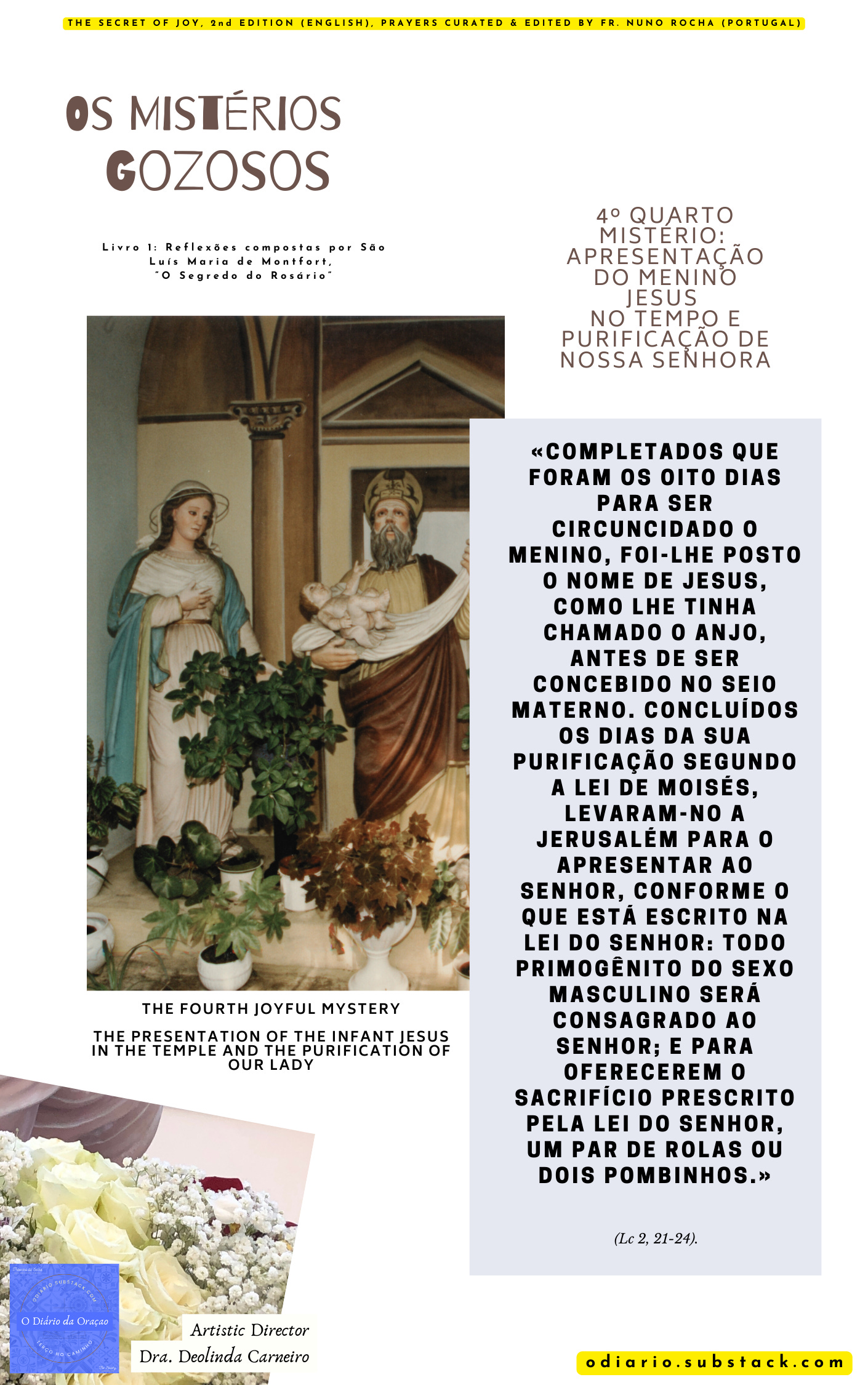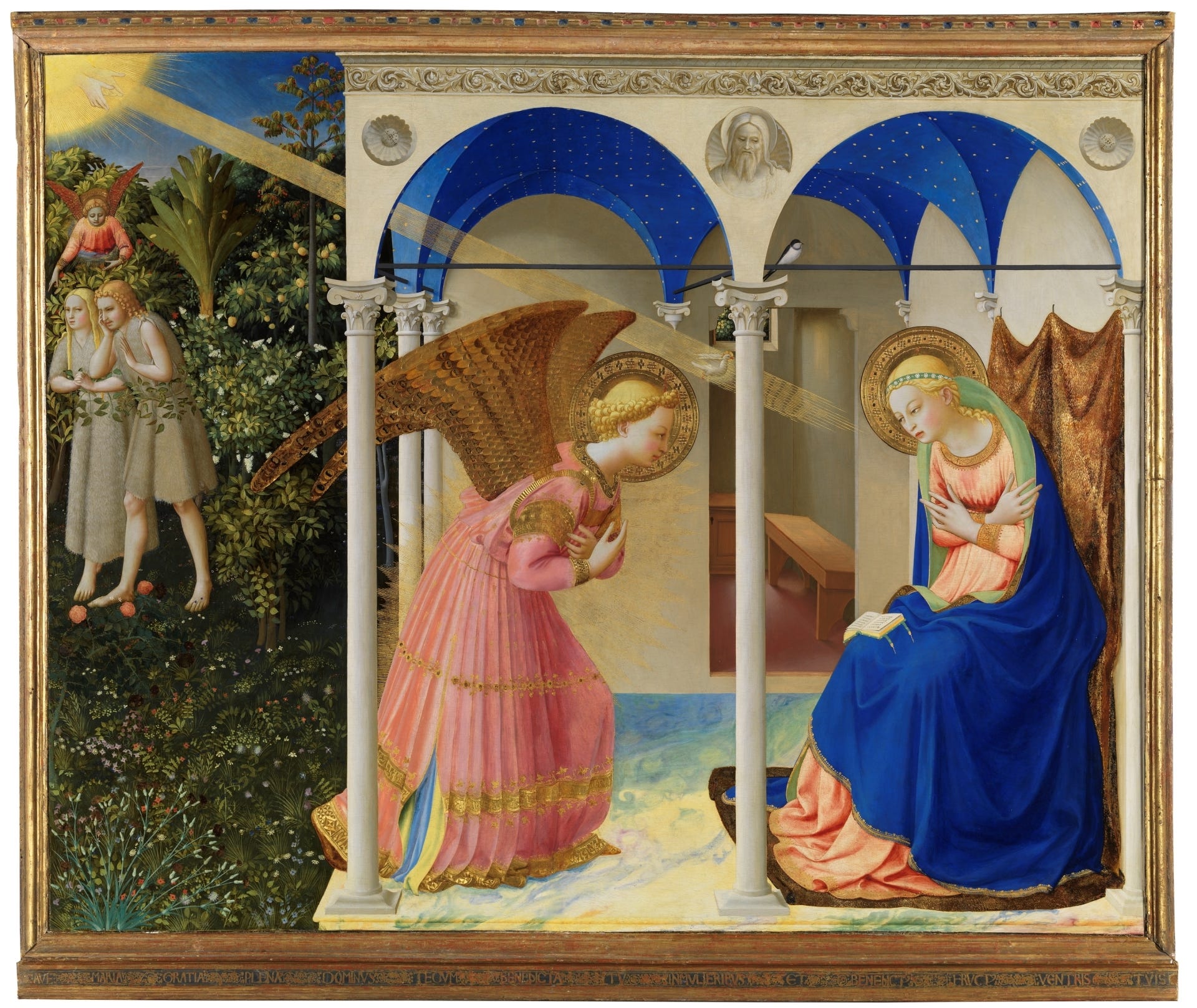SPIRITUAL DIRECTION BY FR. NUNO ROCHA FOR THE YEAR OF PRAYER. SEE THE “TEACH US TO PRAY” DOCUMENT FOR JUBILEE 2025 in footnotes1.
TRAVESSA DA SENRA HOUSE PRESS PRESENTS
A SPECIAL OPPORTUNITY TO ADVANCE IN THE SPIRITUAL LIFE:
“MEDITATE ON THE FIVE JOYFUL MYSTERIES of the HOLY ROSARY”
1st Edition via Substack for the Year of Prayer


O TERÇO | THE ROSARY & MEDITATING ON SCRIPTURE, 2nd Edition
COPY: English Reviewed by Izzy Nunziato. Portuguese Reviewed by Karen Rocha
The above video montage of this broadcast hopes to inspire prayer of the Rosary with highlights from the annual August 15 Festival in Póvoa de Varzim, Portugal which has been a very old tradition and more recently led for over 20 years with the Pastoral Care & Spiritual Direction of Fr. Nuno Rocha. Igreja da Lapa hosts this grandiose procession as a community: it gives public witness to the Gospel while also teaching the 4th Joyful Mystery as articulated by Pope Pius XII.
We invite you to check the footnotes to review his APOSTOLIC CONSTITUTION entitled “MUNIFICENTISSIMUS DEUS”2 which defines as infallible the DOGMA OF THE ASSUMPTION of the Blessed Virgin Mary (November 1, 1950) as well as the edict in “AD CAELI REGINAM” naming Our Lady Queen of the world as we complete this important celebratory octave.3
Today’s post invites pilgrims to pray the entire Rosary in Portuguese, using this guide for Saturdays (today) and Mondays. The Rosary is meditation on the Life of Christ. Learn more from Archbishop Fulton Sheen here: http://www.sacredheartshrine.org/wp-content/uploads/2018/08/Life-of-Christ-Fulton-J.-Sheen.pdf
A new guide to the Luminous Mysteries will follow with Fr. Nuno’s Spiritual Direction for prayers each Thursday, which Fr. David Michael Moses will present as part of his earlier podcast visit.
We hope this handy guide of Scriptural Meditations will help to heighten meditation during this important prayer. Note the reflections by St. Louis Marie de Montfort, as well as helpful imagery curated by Dra. Deolinda Carneiro, expert in Sacred Art in Portugal. Thank you and enjoy and pray the Rosary every day!
O TERÇO | SÁBADO DE NOSSA SENHORA - O TERÇO E MEDITAÇÃO NAS ESCRITURAS
A montagem de vídeo acima desta transmissão espera inspirar a oração do Terço com destaques da Festa Anual de 15 de Agosto na Póvoa de Varzim, Portugal, que tem sido uma tradição muito antiga e mais recentemente liderada por mais de 20 anos com a pastoral e Direção Espiritual do Pe. Nuno Rocha. A Igreja da Lapa acolhe esta grandiosa procissão como uma comunidade: dá testemunho público do Evangelho ao mesmo tempo que ensina o 4º Mistério Gozoso articulado pelo Papa Pio XII. Convidamos você a consultar as "notas de rodapé" para revisar sua CONSTITUIÇÃO APOSTÓLICA intitulada “MUNIFICENTISSIMUS DEUS” que define como infalível o DOGMA DA ASSUNÇÃO da Bem-Aventurada Virgem Maria (1º de novembro de 1950), bem como o edital em “AD CAELI REGINAM” nomeando Nosso Senhora Rainha do Mundo ao completarmos esta importante oitava comemorativa.
O post de hoje convida os peregrinos a rezarem todo o Terço em português, utilizando este guia para os sábados (hoje) e segundas-feiras. Um novo guia para os Mistérios Luminosos seguirá com o Direção Espiritual do Padre Nuno para as orações de todas as quintas-feiras, que o Pe. David Michael Moses fará uma apresentação como parte de sua visita anterior ao podcast.
Esperamos que este guia prático de meditações bíblicas ajude a aumentar a meditação durante esta importante oração. Observe as reflexões de São Luís Maria de Montfort, bem como as imagens úteis com curadoria da Dra. Deolinda Carneiro, especialista em Arte Sacra em Portugal. Obrigado e aproveite e reze o Terço todos os dias!MUSINGS ON PRAYER
(SOBRE O TERÇO)
by: THE ROSARY HOUR PODCAST
Prayer is not a habit.
Prayer is one of four acts of the virtue of Religion4:
AdorationContritionSupplicationThanksgiving
The act of prayer involves the virtue of sacrifice, especially of our time such that we will give God His due5 and it also calls us to joyfully master the virtues which grace grants to us so that we might walk the path of sanctity. This path taught to us by Jesus Christ and Our Lady and the Saints after her give us hope that one day, we might with persevering prayer, have in full, the ability to contemplate God and be in His everlasting presence forever. This pursuit of the discipline of prayer through unwavering confidence in God’s grace we ask He bestow through the intercession of the Blessed Mother, in whom the Holy Spirit dwells, knows no limits or bounds.
A oração não é um hábito.
A oração é um dos quatro atos da virtude da Religião:
Adoração, Contrição, Súplica e Ação de Graças.
O ato de oração envolve a virtude do sacrifício, especialmente do nosso tempo, para que possamos dar a Deus o que Lhe é devido Além disso, chama-nos a dominar com alegria as virtudes que a graça nos concede para que possamos trilhar o caminho da santidade.
Este caminho que nos foi ensinado por Jesus Cristo e por Nossa Senhora e também Santos dá-nos esperança de que um dia, com oração perseverante, possamos ter plena capacidade de contemplar Deus e estar para sempre na Sua presença eterna.
Esta busca da disciplina da oração através da confiança inabalável na graça de Deus que pedimos que Ele conceda através da intercessão da Nossa Mãe Santíssima, em quem o Espírito Santo habita, não conhece limites.Thus, when we pray the Rosary, for at least 15 minutes a day, we are inviting God to increase in us Faith, Hope and Love. When we apply our time toward the building up of the virtues which are also embedded in these prayerful meditations on scripture and the mysteries of joy in the Holy Rosary, we begin to recognize how God is the one who grants to us the grace to love Him and who draws us closer to Himself when we pray the Rosary every day.
Below is a list of promises made by Our Lady to Bl. Alan to those who demonstrate a true devotion to the Holy Rosary.
Assim, quando rezamos o Terço, pelo menos 15 minutos por dia, estamos convidando Deus a aumentar em nós a Fé, a Esperança e o Amor. Quando aplicamos nosso tempo na construção das virtudes que também estão incorporadas nessas meditações orantes sobre as Escrituras e nos mistérios da alegria (Gozosos) do Santo Rosário, começamos a reconhecer como Deus é aquele que nos concede a graça de amá-lo e que nos aproxima de Si quando rezamos o Terço todos os dias.
Abaixo está uma lista de promessas feitas por Nossa Senhora ao Beato Alan para aqueles que demonstram uma verdadeira devoção ao Santo Rosário.15 PROMISES TO THOSE WHO PRAY THE HOLY ROSARY
“Whoever shall faithfully serve me by the recitation of the Rosary, shall receive signal graces.”6
“I promise my special protection and the greatest graces to all those who shall recite the Rosary.”
“The Rosary shall be a powerful armor against hell, it will destroy vice, decrease sin, and defeat heresies.”
“It will cause virtue and good works to flourish; it will obtain for souls the abundant mercy of God; it will withdraw the hearts of people from the love of the world and its vanities, and will lift them to the desire of eternal things. Oh, that souls would sanctify themselves by this means.”
“The soul which recommends itself to me by the recitation of the Rosary, shall not perish.”
“Whoever shall recite the Rosary devoutly, applying himself to the consideration of its Sacred Mysteries shall never be conquered by misfortune. God will not chastise him in His justice, he shall not perish by an unprovided death; if he be just, he shall remain in the grace of God, and become worthy of eternal life.”
“Whoever shall have a true devotion for the Rosary shall not die without the Sacraments of the Church.”
“Those who are faithful to recite the Rosary shall have during their life and at their death the light of God and the plenitude of His graces; at the moment of death they shall participate in the merits of the Saints in Paradise.”
“I shall deliver from purgatory those who have been devoted to the Rosary.”
“The faithful children of the Rosary shall merit a high degree of glory in Heaven.”
“You shall obtain all you ask of me by the recitation of the Rosary.”
“All those who propagate the Holy Rosary shall be aided by me in their necessities.”
“I have obtained from my Divine Son that all the advocates of the Rosary shall have for intercessors the entire celestial court during their life and at the hour of death.”
“All who recite the Rosary are my children, and brothers and sisters of my only Son, Jesus Christ.”
“Devotion of my Rosary is a great sign of predestination.”
NOSSA SENHORA FAZ 15 PROMESSAS AOS QUE REZAM O SANTO ROSÁRIO (Terço)
1) Quem me servir constantemente rezando o meu Terço receberá qualquer graça especial.
2) A todos aqueles que devotamente rezarem o meu saltério (Terço), prometo a minha especialíssima proteção e grandes graças.
3) O Terço será uma arma potentíssima contra o inferno, destruirá os vícios e o pecado e abaterá as heresias.
4) O Terço fará florescer as virtudes e as obras santas, fará conseguir às almas as copiosas misericórdias de Deus, desapegará os corações dos homens do amor vão do mundo e os levantará ao desejo das coisas eternas. Oh, quantas almas se santificarão por este meio!
5) A alma que se recomendar a mim, com o Terço, não perecerá.
6) Todo aquele que rezar devotamente o Terço com a contemplação dos seus sagrados mistérios não será oprimido pelas desgraças, não será castigado pela justiça de Deus e não morrerá de morte repentina, mas se converterá se for pecador, se conservará em graça se for justo e se fará digno da vida eterna.
7) Os verdadeiros devotos do meu Terço não morrerão sem os Santíssimos Sacramentos.
8) Os que rezarem o meu Terço terão em vida e na morte a luz e a plenitude da graça e em vida e na morte serão admitidos a participar dos méritos dos bem-aventurados do Céu.
9) Os devotos do meu Terço que forem para o purgatório, eu os libertarei no mesmo dia.
10) Os verdadeiros filhos do meu Terço gozarão de grande glória no Céu.
11) Tudo o que for pedido por meio do Terço será concedido.
12) Os que propagarem o meu Terço serão por mim socorridos em todas as suas necessidades.
13) Eu consegui do meu Divino Filho que todos os da confraternidade do Terço tenham por seus confrades todos os da corte celeste em vida e na morte.
14) Os que rezarem o meu Terço são meus filhos e irmãos de Jesus Cristo, meu Unigênito.
15) A devoção ao meu Terço é um grande sinal de predestinação.“THE SECOND JOYFUL MYSTERY”
“THE THIRD JOYFUL MYSTERY”
“THE FOURTH JOYFUL MYSTERY”
“THE FIFTH JOYFUL MYSTERY”
CONCLUDING PRAYERS OF THE TERÇO
Pray the 3 Avé Marias with Miraculous Medal Prayers
LEITOR: Avé Maria…
TODOS: Santa Maria…
LEITOR: Ó Maria concebida sem pecado.
TODOS: Rogai por nós, que recorremos a Vós.
Pray the entire “Salve Regina” in Portuguese (Learn using Fr. Nuno’s video when you CLICK here).
Pray the each day the consecration to the Immaculate Heart of Mary
Ó Senhora minha, ó minha Mãe,
eu me ofereço todo(a) a vós,
e em prova da minha devoção para convosco,
Vos consagro neste dia e para sempre,
os meus olhos, os meus ouvidos,
a minha boca, o meu coração e inteiramente todo o meu ser.
E porque assim sou vosso(a),
ó incomparável Mãe,
guardai-me e defendei-me como propriedade vossa.
Lembrai-vos que vos pertenço, terna Mãe, Senhora nossa.
Ah, guardai-me e defendei-me como coisa própria vossa.
In private, you can pray the “Litany to Loretto” CLICK HERE for the PORTUGUESE
Finally, make the Sign of the Cross: “In the name of the Father, and of the Son, and of the Holy Spirit, Amen!”
If time, sing a Marian Canticle / Marian Hymn and invite children to join you!
Pray the Rosary Every Day!
Virtude da Religião: adoração, louvor, ação de graças, lealdade e amorDas três derivações propostas para a palavra “religião”, aquela sugerida por Lactâncio e endossada por Santo Agostinho parece talvez concordar melhor com a ideia do que as outras. Ele diz que vem de religare, vincular. Significaria, portanto, o vínculo que une o homem a Deus. A noção disso comumente aceita entre os teólogos é aquela que se encontra na "Summa Theologica" de São Tomás, II-II, Q. lxxxi. Segundo ele, é uma virtude cujo propósito é prestar a Deus o culto que lhe é devido como fonte de todo ser e princípio de todo governo das coisas. Não pode haver dúvida de que é uma virtude distinta, e não apenas uma fase de outra. Diferencia-se dos demais pelo seu objetivo, que é oferecer ao Deus Todo-Poderoso a homenagem exigida por Sua excelência inteiramente singular. Numa construção livre, pode ser considerada uma virtude geral na medida em que prescreve os atos de outras virtudes ou os exige para o desempenho das suas próprias funções. Não é uma virtude teológica, porque o seu objeto imediato não é Deus, mas sim a reverência a ser prestada a Ele. A sua prática está frequentemente associada às virtudes da fé e da caridade. Ainda assim, o julgamento concordante dos teólogos a coloca entre as virtudes morais, como parte da virtude cardeal, a justiça, uma vez que através dela damos a Deus o que Lhe é devido. São Tomás ensina que ela ocupa o primeiro lugar entre as virtudes morais. Uma atitude religiosa para com Deus é essencialmente o produto do nosso reconhecimento, não apenas da Sua majestade soberana, mas também da nossa absoluta dependência Dele. Assim, como diz o Padre Rickaby, Ele não é apenas “o Grande Estrangeiro”, cujo comportamento deve ser investido de respeito e admiração; Ele está além de nosso Criador e Mestre e, em virtude de nossa filiação sobrenatural na atual ordem das coisas, nosso Pai. Portanto, somos obrigados a nutrir habitualmente para com Ele sentimentos de adoração, louvor, ação de graças, lealdade e amor. Tal comportamento da alma é inexoravelmente exigido pela própria lei do nosso ser. Não devemos, no entanto, ficar satisfeitos porque talvez o nosso rolamento interior esteja em conformidade com este padrão. Não somos simplesmente espíritos. Nossa natureza composta precisa se expressar por meio de atos externos nos quais tanto o corpo quanto a alma terão uma parte - isso não apenas para estimular nossos sentimentos internos, mas também porque Deus é dono de nosso corpo e alma, e é certo que ambos deveriam mostrar sua fidelidade a Ele. Esta é a justificativa da religião externa.FOOTNOTES / "notas de rodapé"
https://www.vatican.va/content/pius-xii/en/apost_constitutions/documents/hf_p-xii_apc_19501101_munificentissimus-deus.html
c.f. https://www.vatican.va/content/pius-xii/en/encyclicals/documents/hf_p-xii_enc_11101954_ad-caeli-reginam.html
The virtue of “religion” itself can be categorized under the Cardinal Virtue of “Justice”. When we pray, we are in fact participating in heightening this basic virtue. When we then participate in the sacraments of the Catholic Church, we then increase the virtue of Justice beyond the natural plane and ask God to infuse it with supernatural virtue — the reason we ask in prayer of the Rosary for an increase in the Theological Virtues of Faith, Hope, Love, without which we cannot go to Heaven. In short, we are granted at the Holy Sacrifice of the Mass “supernatural grace” which can be received through the miracle of the sacrament of the Eucharist — and which is enabled when we receive into the throne of our hearts, Jesus Christ in a state of grace. What the story of Fátima helped us to recognize was that when we pray the Holy Rosary daily, Our Lady encourages us to walk the road of restoring our right praise to God by increasing in us the supernatural capacity to increase virtue: “Quero ser como Tu, como Tu Maria”! And that we request this “infusion of supernatural grace” when we begin the Holy Rosary, makes us understand why the Rosary which prays the pendant prayers that St. Louis Marie de Montfort examines in his book ‘The Secret of the Rosary” in which he recommends the Rosary begin with the Creed, followed by the Pai Nosso, the Avé Maria, and the Glória (this is to request the Theological Virtues become superabundant in our souls: we ask for an increase of Faith, an increase of Hope, an an increase of love. See the toolkit here.
See Fr. Peter’s video here to experience the Pendant prayers the English rendition of the Rosary:
The above Rosary is featured on our First Saturday page here:
Here we define the purpose of prayer with the help of Fr. Elias Mary Mills, FI. Another useful definition with some slightly extended observations on the virtues is as follows from New Advent: https://www.newadvent.org/cathen/12748a.htm
Of the three proposed derivations of the word "religion", that suggested by Lactantius and endorsed by St. Augustine seems perhaps to accord better with the idea than the others. He says it comes from religare, to bind. Thus it would mean the bond uniting man to God. The notion of it commonly accepted among theologians is that which is found in St. Thomas's "Summa Theologica", II-II, Q. lxxxi. According to him it is a virtue whose purpose is to render God the worship due to Him as the source of all being and the principle of all government of things. There can be no doubt that it is a distinct virtue, not merely a phase of another. It is differentiated from others by its object, which is to offer to Almighty God the homage demanded by His entirely singular excellence. In a loose construction it may be considered a general virtue in so far as it prescribes the acts of other virtues or requires them for the performance of its own functions. It is not a theological virtue, because its immediate object is not God, but rather the reverence to be paid to Him. Its practice is indeed often associated with the virtues of faith and charity. Still the concordant judgment of theologians puts it among the moral virtues, as a part of the cardinal virtue justice, since by it we give God what is due to Him. St. Thomas teaches that it ranks first among moral virtues. A religious attitude towards God is essentially the product of our recognition, not only of His sovereign majesty, but also of our absolute dependence on Him. Thus, as Father Rickaby says, He is not merely "the Great Stranger", our behaviour towards whom must be invested with awe and admiration; He is besides our Creator and Master and, in virtue of our supernatural filiation in the present order of things, our Father. Hence we are bound to cherish habitually towards Him sentiments of adoration, praise, thanksgiving, loyalty, and love. Such a demeanour of soul is inexorably required by the very law of our being. We must not, however, rest satisfied because perchance our interior bearing is fairly in conformity with this standard. We are not simply spirits. Our composite nature needs to express itself by outward acts in which the body as well as the soul shall have a part — this not only to spur on our inner feelings, but also because God owns us body and soul, and it is right that both should show their fealty to Him. This is the justification of external religion.
Signal graces are explained by many different YouTubers on the Gabi After Hours channel, and here:
https://laycistercians.com/signal-graces/
and here:





























Share this post